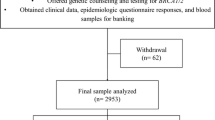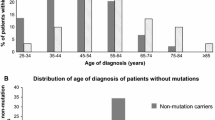Abstract
Tumor characteristics are used today to evaluate the possibility of mutation and to target mutation screening in families with high risk of breast and/or ovarian cancer. We studied the breast tumor profile associated to the c.3481_3491del11 French founder effect mutation on the BRCA1 gene to an attempt to identify any particularity or difference when comparing it to that related to other BRCA1 mutations. Within the population who were referred to our oncogenetic clinic at the Lorraine Oncology Institute in France and who underwent genetic testing between 1994 and 2012, we identified 404 women carrying a BRCA1 mutation. Interestingly, 45% (180/404) women had the germline c.3481_3491del11 mutation. These included 91 patients affected by first breast cancer. Clinical and pathologic data were retrieved from medical files. Descriptive statistics were conducted using the SPSS software (version 20.0). For the entire cohort of 91 women, the mean age was 43.64 years (SD 10.04). Tumors were identified in 37.4% of cases aged < 40 years. Estrogen receptor status and progesterone receptor status were reported to 67 patients. Seventy-four percent were ER negative. Hormonal receptors status was negative in 68.6% of tumors. HER2 status was available for 32 tumors. The triple-negative subtype was found in 21 cases, which accounts for 65.6% of the patients. High tumor grade was found in 81% of triple negative breast cancer patients. Based on our results compared to those of previous international studies, we concluded that the breast cancer associated to the c.3481_3491del11 is not different from that associated to other BRCA1 mutations. A larger cohort with complete information on the breast cancer pathologic characteristics and including other BRCA1 mutations would allow us to statistically compare the breast tumor profile associated to the c.3481_3491del11 to that related to other BRCA1 mutations.
Similar content being viewed by others
References
Fricker JP, Muller D, Cutuli B, Rodier JF, Janser JC, Jung GM, Mors R, Petit T, Haegele P, Abecassis J (2000) Germ-line mutations at BRCA1 in northeastern France. Bull Cancer 87(10):739–744
Muller D, Bonaiti-Pellié C, Abecassis J, Stoppa-Lyonnet D, Fricker JP (2004) BRCA1 testing in breast and/ or ovarian cancer families from northeastern France identifies two common mutations with a founder effect. Fam Cancer 3:15–20
Janezic S, Ziogas A, Krumroy L, Krasner M, Plummer S, Cohen P (1999) Germline BRCA1 alterations in a population-based series of ovarian cancer cases. Hum Mol Genet 8(5):889–897
Dong J, Chang-Claude J, Wu Y et al (1998) A high proportion of mutations in the BRCA1 gene in German breast/ovarian cancer families with clustering of mutations in the 3′ third of the gene. Hum Genet 103:154–161
Atchley DP, Albarracin CT, Lopez A et al (2008) Clinical and pathologic characteristics of patients with BRCA-positive and BRCA-negative breast cancer. J Clin Oncol 26(26):4282–4288
Lahkani SR, van de Vijver MJ, Jacquemier J, Anderson TJ, Osin PP, McGuffog L et al (2002) The pathology of familial breast cancer: predictive value of immunohistochemical markers estrogen receptor, progesterone receptor, HER-2, and p53 in patients with mutations in BRCA1 and BRCA2. J Clin Oncol 20:2310–2318
Foulkes WD, Metcalfe K, Sun P, Hanna WM et al (2004) Estrogen receptor status in BRCA1 and BRCA2 related breast cancer: the influence of age, grade, and histological type. Clin Cancer Res 10:2029–2034
Veronesi A, de Giacomi C, Magri MD et al (2005) Familial breast cancer: characteristics and outcome of BRCA 1–2 positive and negative cases. BMC Cancer 5:70
Brose M, Rebbeck T, Calzone Kathleen et al (2002) Cancer risk estimates for BRCA1 mutation carriers identified in a risk evaluation program. J Natl Cancer Inst 94(18):1365–1372
Tung N, Wang Y, Collins L, Kaplan J, Hailun L et al (2010) Estrogen receptor positive breast cancers in BRCA1 mutation carriers: clinical risk factors and pathologic features. Breast Cancer Res 12:R12
Litwiniuk MM, Roznowski K, Filas V, Godlewski DD, Stawicka M, Kaleta R et al (2008) Expression of estrogen receptor beta in breast carcinoma of BRCA1 mutation carriers. BMC Cancer 8:100
Loman N, Johannsson O, Bendahl PO, Borg A, FernÓ§ M, Olsson H (1998) Steroid receptors in hereditary breast carcinomas associated with BRCA1 or BRCA2 mutations or unknown susceptibility genes. Cancer 83(2):310–319
Johannsson OT, Idvall I, Anderson C et al (1997) Tumour biological features of BRCA1-induced breast and ovarian cancer. Eur J Cancer A 33(3):362–371
Peyrat JP, Vennin P, Hornez L, Bonneterre J (1997) Mutations germinales de BRCA1 chez 36 patientes atteintes de cancer du sein et/ou de l’ovaire et appartenant à des familles à risque du Nord de la France. Bull Cancer 84(1):41–46
Eisinger F, Bressac B, Castaigne D, Cottu PH, Lansac J, Lefranc JP et al (2004) Identification et prise en charge des prédispositions héréditaires aux cancers du sein et de l’ovaire. Bull Cancer 91:219–237
Goldhirsch A, Winer EP, Coates AS, Gelber RD, Piccart-Gebhart M et al (2013) Personalizing the treatment of women with early breast cancer: highlights of the St Gallen International Expert Consensus on the Primary Therapy of Early Breast Cancer 2013. Ann Oncol 24:2206–2223
Musolino A, Michiara M, Bella M, Naldi N, Zanelli P et al (2005) Molecular profile and clinical variables in BRCA1-positive breast cancers: a population-based study. Tumori 91:505–512
Eerola H, Heikkila P, Tamminen A et al (2005) Histopathological features of breast tumours in BRCA1, BRCA2 and mutation-negative breast cancer families. Breast Cancer Res 7:R93–R100
Mavaddat N, Barrowdale D, Andrulis I et al (2012) Pathology of Breast and Ovarian cancers among BRCA1 and BRCA2 mutation carriers: results from the consortium of investigators of modifiers of BRCA1/2 (CIMBA). Cancer Epidemiol Biomark Prev 21:134–147
Vaziri S, Krumrey L, Elson P et al (2001) Breast tumor immunophenotype of BRCA1-mutation carriers is influenced by age at diagnosis. Clin Cancer Res 7:1937–1945
Eisinger F, Nogues C, Birnbaum D, Jacquemier J, Sobol H (1998) BRCA1 and medullary breast cancer. JAMA 280:1227–1228
Claus EB, Petruzella S, Matloff E, Carter D (2005) Prevalence of BRCA1 and BRCA2 mutations in women diagnosed with ductal carcinoma in situ. JAMA 293:964–969
Hwang ES, McLennan JL, Morre DH, Crawford BB, Esserman LJ, Ziegler JL (2007) Ductal carcinoma in situ in BRCA mutation carriers. J Clin Oncol 25:642–647
Smith KL, Adank M, Kauff N et al (2007) BRCA mutations in women with ductal carcinoma in situ. Clin Cancer Res 13:4306–4310
Tommasi S, Crapolicchio A, Lacalamita R et al (2005) BRCA1 mutations and polymorphisms in a hospital-based consecutive series of breast cancer patients from Apulia, Italy. Mutat Res 578:395–405
Comen E, Davids M, Kirchhoff T, Hudis C, Offit K, Robson M (2011) Relative contributions of BRCA1 and BRCA2 mutations to “triple-negative” breast cancer in Ashkenazi women. Breast Cancer Res Treat 129(1):185–190
Noguchi S, Kasugai T, Miki Y et al (1999) Clinicopathologic analysis of BRCA1- or BRCA2-associated hereditary breast carcinoma in Japanese women. Cancer 85:2200–2205
Jo´hannsson OT, Idvall I, Anderson C et al (1997) Tumour biological features of BRCA1-induced breast and ovarian cancer. Eur J Cancer 33:362–371
Thompson D, Easton D (2001) Breast Cancer Linkage Consortium: variation in cancer risks, by mutation position, in BRCA2 mutation carriers. Am J Hum Genet 68(2):410–419
Thompson D, Easton D (2002) Breast Cancer Linkage Consortium. Variation in BRCA1 cancer risks by mutation position. Cancer Epidemiol Biomark Prev 11(4):329–336
Lecarpentier J, Noguès C, Mouret-Fourme E, Stoppa-lyonnet D, Lasset C et al (2012) Variation in breast cancer risk with mutation position, smoking, alcohol, and chest X-ray history, in the French National BRCA1/2 carrier cohort (GENEPSO). Breast Cancer Res Treat 14:1–13
Author information
Authors and Affiliations
Corresponding author
Ethics declarations
Conflict of interest
The authors declare that they have no conflict of interest.
Ethical approval
This project was performed in compliance with the relevant ethical standards in France.
Rights and permissions
About this article
Cite this article
El Tannouri, R., Albuisson, E., Jonveaux, P. et al. Clinical and pathologic characteristics of breast cancer patients carrying the c.3481_3491del11 mutation. Familial Cancer 18, 1–8 (2019). https://doi.org/10.1007/s10689-018-0079-1
Published:
Issue Date:
DOI: https://doi.org/10.1007/s10689-018-0079-1




